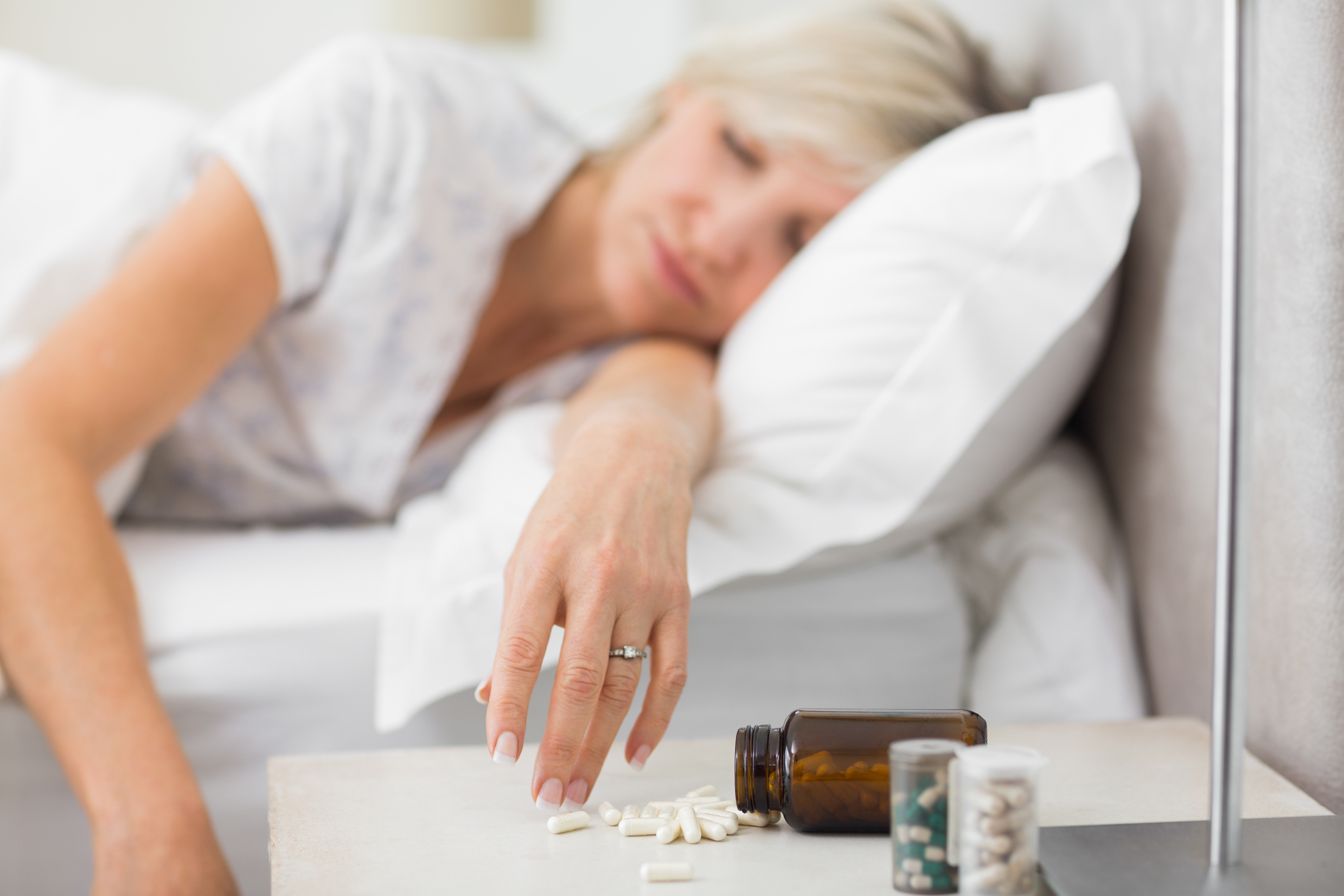Get Easy Health Digest™ in your inbox and don’t miss a thing when you subscribe today. Plus, get the free bonus report, Mother Nature’s Tips, Tricks and Remedies for Cholesterol, Blood Pressure & Blood Sugar as my way of saying welcome to the community!
Over 65? Think twice about taking sleeping pills

Right along with good nutrition, hydration and physical activity, a good night’s sleep is one of our essential health needs.
We all have trouble falling asleep sometimes. Worries, or even a busy, active day can make it hard to settle down at night.
But for many of us, insomnia has become a way of life. As many as one in ten adults suffers with chronic insomnia, the inability to fall asleep or stay asleep.
Chronic sleep deprivation affects all other areas of our health and well-being. Non-sleepers are at higher risk for depression, heart disease, diabetes and obesity, as well as accidents, falls and memory loss.
It’s no wonder, then, that about nine million of us are using sleeping pills every night.
But recent research is telling us that this practice may have even more dire consequences than the insomnia it’s meant to control…
OTC sleep aids: Use with caution
Sleep medications can be obtained either over-the-counter or by prescription. Over-the-counter sleep aids include products with names like Nytol and Sominex, which contain diphenhydramine. Others, like Unisom, contain doxylamine.
Some OTC sleep aids also contain antihistamines to induce sleepiness. But the sedating effects of antihistamines often last well into the next day.
Regular antihistamine users can experience dizziness, disorientation and accidents the following day. When used daily, antihistamines can also cause nausea, dry mouth and throat, constipation and blurred vision.
Types of sleeping pills
People who have chronic sleep problems often turn to their doctor for answers in the form of a prescription for sleeping pills. These fall into two classes: benzodiazepines and non-benzodiazepines.
Benzodiazepines (often called “benzos” for short) are the oldest class of sleep medications. They’re commonly known as tranquilizers and include familiar names like Valium and Xanax. Benzodiazepines work by stimulating the neurotransmitter GABA in the brain, whose function is to calm and slow down brain activity.
Non-benzodiazepines are a newer class of drug. They act on the same area of the brain, and have fewer but still significant side effects, like morning grogginess, headaches and dry mouth. Sleep-walking is also a hazard with this class of drug, which includes names like Ambien and Lunesta.
“Benzos” come with “senior” risks
Unfortunately, the sleep benefits available from benzodiazepines can be far outweighed by the side effects and health risks, particularly for older adults. The risks include:
- Physical and psychological dependence. You can become addicted to benzodiazepines. Trying to stop taking them, even under a doctor’s supervision (the only way it should be done) can result in severe anxiety and “rebound” insomnia that’s worse than the original problem.
- Drug tolerance. Nightly use of a benzodiazepine can cause brain receptors to become less and less sensitive to their effects, eventually making them ineffective (but leaving the user with the side effects and need for withdrawing from the medication slowly).
- Slow thinking. Many people experience “brain fog” and unclear thinking when taking benzodiazepines, sometimes worse than the insomnia symptom they’re meant to treat.
Older adults are more sensitive to the side effects of “benzos” and the drugs stay in their systems longer, thanks to a slower metabolism.
Dr. Rachel Morehouse, a psychiatrist and medical director at Saint John Regional Hospital’s Atlantic Sleep Center in New Brunswick, feels that people 65 and over are no longer good candidates for benzodiazepines.
The biggest risk she cites is the likelihood of falling.
“Getting up to go to the washroom becomes more common as you get older… if you’ve got a sleep medication on board … that causes you to fall. Then, because you have osteoporosis, you break something and end up in the hospital. Then a whole host of bad things can happen.”
Natural alternatives to help you sleep
Fortunately, there are natural alternatives you can turn to. But please note: withdrawing from sleep meds suddenly or improperly can cause very troubling physical and psychological symptoms. Any withdrawal from sleep medications should always be done under the care and supervision of a doctor.
That said, here are some possibilities for natural ways to deal with sleep difficulties, starting with food.
Think of the foods you eat as falling on a sleep index. Foods that are high on that index contain tryptophan, an amino acid that the body converts into relaxation-inducing neurotransmitters like serotonin and melatonin.
High-tryptophan foods include turkey, cherries, hummus, lentils and bananas.
Here’s some more information on foods to help you sleep and other natural sleep aids.
Editor’s note: While you’re doing all the right things to protect your brain as you age, make sure you don’t make the mistake 38 million Americans do every day — by taking a drug that robs them of an essential brain nutrient! Click here to discover the truth about the Cholesterol Super-Brain!
Sources
- Sleeping Pills & Natural Sleep Aids — Helpguide.org
- The dangers of sleeping pills for seniors — The Globe and Mail
- Cumulative Use of Strong Anticholinergic Medications and Incident Dementia — JAMA Internal Medicine
- Benzodiazepine use and risk of dementia: prospective population based study — BMJ
- Do Benzodiazepines Pose A Dementia Risk? — Alzheimer’s Drug Discovery Foundation













